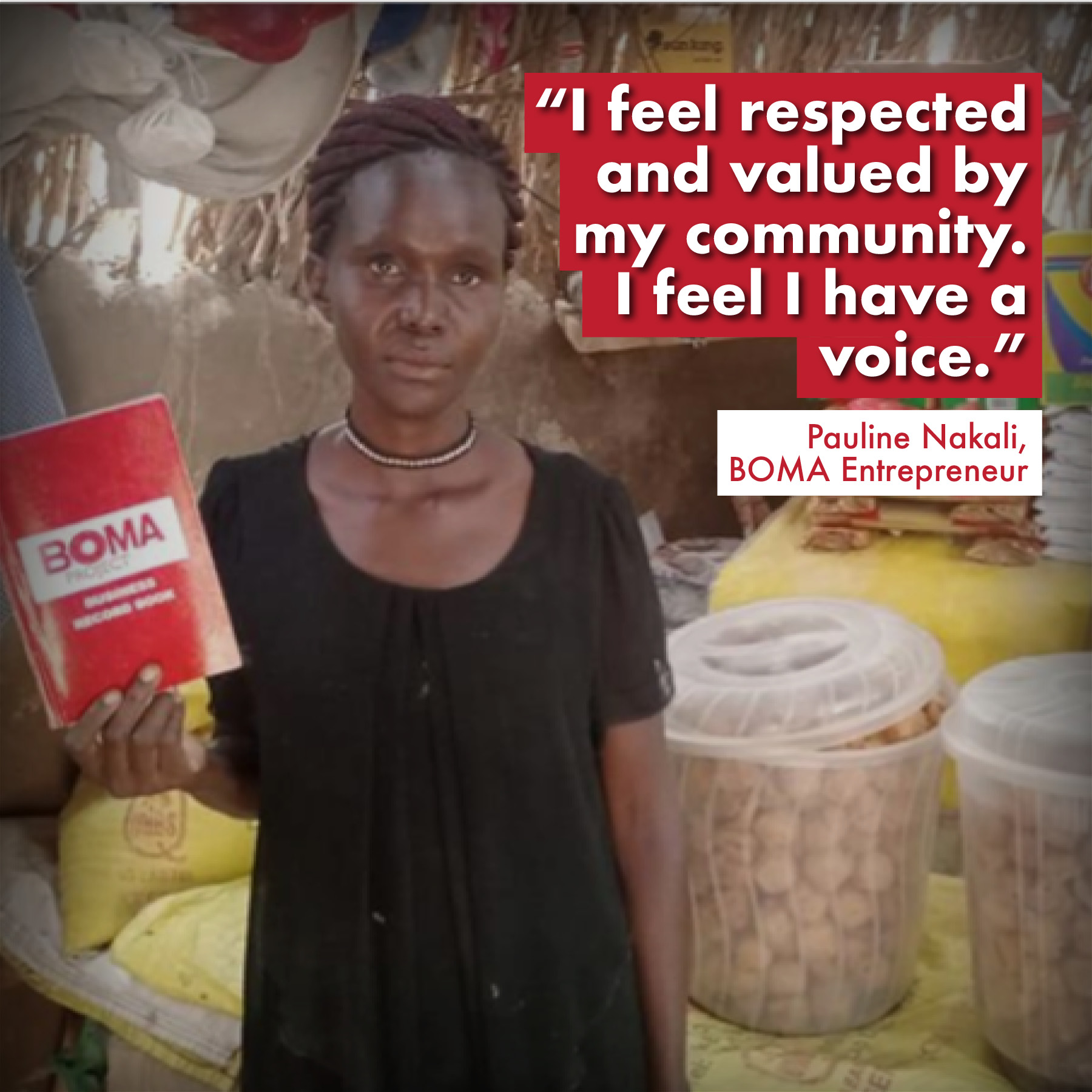Meet Pauline Nakali: Survivor and Entrepreneur

Reaching More People Like Pauline
BOMA and the IKEA Foundation have teamed up to transform the lives of those most impacted by the climate crisis by delivering vital livelihood opportunities in Northern Kenya. These “Green” enterprises will empower program participants to lift their families out of extreme poverty while protecting critical natural resources.
What does it mean to escape the vicious cycle of extreme poverty? For many of us, it is difficult to understand the realities of daily life in the places most impacted by climate change — but Pauline Nakali, 29, has lived it.
December 12, 2022
TURKANA — Pauline Nakali is a single mother of 4 who was raised by a single mother herself. When Pauline was young, however, her mother suffered a mental break that left her family without a provider.
In 2009, Pauline was poised to complete her primary education but, sadly, could not continue her schooling as her mother was unable to pay. Soon after, Paulina’s two brothers had to drop out of school as well. The mounting stress took a toll on their mother, who absconded to the nearby Loima Forest where she soon became lost. For weeks Pauline and her siblings combed to rugged landscape searching for her.
One evening, a family friend offered to walk with Paulina to look for her mother. He did not want her to be afraid in the forest. Paulina did not yet know that he was the one she should fear.
“In the middle of the forest, he raped me,” she said. “I was 16 years old. He said that he would kill me if I said anything to my brothers or relatives.”
While her mother was eventually found safely, the incident scarred Pauline deeply.
“We had all dropped out of school, my mother was lost, and this man took advantage of me,” Pauline explained. “It felt like psychological torture.”
Compounding her stress was a secret she could not conceal for long — the rape had left Pauline pregnant. A mixture of tradition and lack of support left Pauline with no option but to wed her rapist.
“My education was over, and my family had fallen apart,” Pauline said. “I accepted my situation and hoped that things would change for the better.”
Pauline went on to have another child with her abuser turned husband, who became more violent as the years went by.
“He began beating me and our children and humiliating me, and he stopped providing for us,” Pauline explained. “Eventually, he married another woman and abandoned us.”
Two years later, another family friend grew close to Pauline under the guise of helping her care for her sick mother and young children. They soon married and had two children together. But again, her second husband abandonded her and she was left alone to provide for her children.
“I had to care for four children, my mother, and my brother,” Pauline said. “I had no way to make money and we were desperate. I resorted to cutting down trees in the forest for firewood and charcoal.”
Like many in her situation, Pauline was eventually caught by local authorities for illegal cutting and burning of the forest. She was once again left desperate for ways to provide for her family.
In June 2021, Pauline’s future began to brighten when she was selected to enroll in BOMA’s program. She was able to stop taking from the forest to survive, and learned how to protect and preserve the land instead. Pauline was matched with two business partners and, as She could read and write from her primary schooling, she was selected as the leader of their business group — and a leader she has become.
In their first year of business selling food and wholesale goods, Pauline and her partners grew the $300 grant provided by BOMA to $700 in revenue. When they received a second grant to grow their business, Pauline and her partners upgraded from a small stall to larger, sturdier space to accommodate their growing stock.
Today their business is thriving, and Pauline can not only rely on her income but save for the future as well. All of her four children are enrolled in school, and she is even helping to pay school fees for her nieces and nephews.
“I used to be treated as a nobody, an outcast, and I carried so much shame,” Pauline said. “BOMA changed my life, and I am so thankful. Now, I feel respected and valued by my community. I feel I have a voice.”
On top of her role in the community as a successful businesswoman, Pauline has also taken on a role at her local health center as a patient attendant. Through this work she earns an additional $80 per month which goes directly into savings.
“So many organizations have come and gone in our community, but BOMA is the one that has truly made an impact,” Pauline said. “I am a living testament.”
